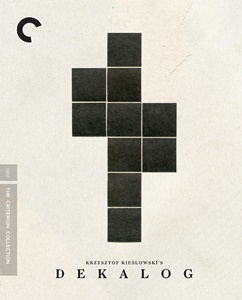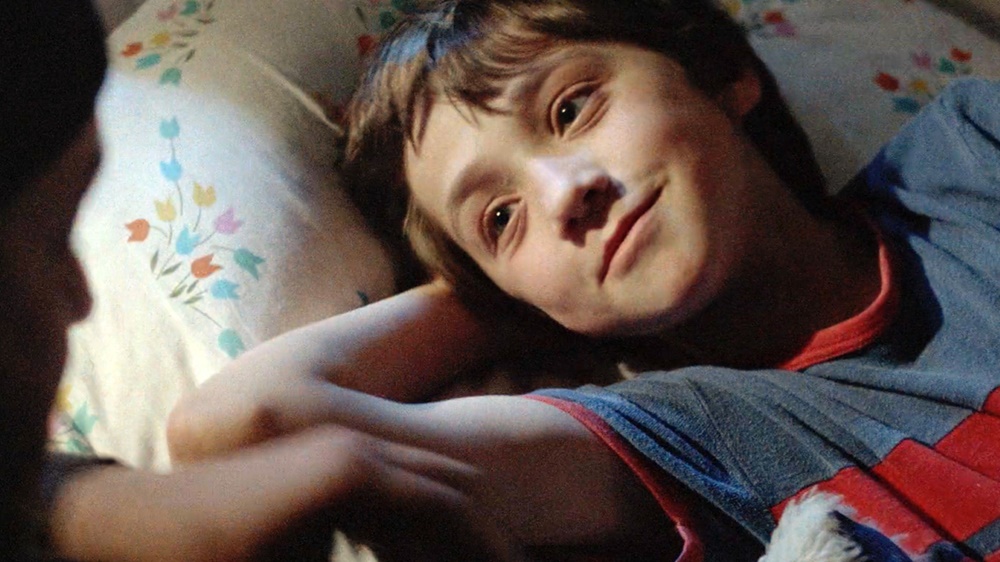Belief systems—namely science and faith—meet at the crossroads in this powerful and devastating first episode of ‘Dekalog’.
Dir. Krzysztof Kieslowski
1988 | Poland/West Germany | Drama | 55 mins | 1.33:1 | Polish
Not rated (likely to be PG13 for some mature themes)
Cast: Henryk Baranowski, Wojciech Klata, Maja Komorowska
Plot: Krzysztof, a semantics professor and computer hobbyist, is raising his young son, Pawel, to look to science for answers, while Irena, Pawel’s aunt, lives a life rooted in faith. Over the course of one day, both adults are forced to question their belief systems. (from The Criterion Collection)
Awards: Won FIPRESCI Prize & Children and Cinema Award (Venice). Official Selection (Cannes).
Source: Telewizja Polska S.A.
Accessibility Index
Subject Matter: Moderate
Narrative Style: Slightly Complex
Pace: Slightly Slow
Audience Type: Slightly Arthouse

(Reviewed on Criterion Blu-ray – first published 10 Feb 2017)
Reviews:
Dekalog: Two
Dekalog: Three
Dekalog: Four
Dekalog: Five
Dekalog: Six
Dekalog: Seven
Dekalog: Eight
Dekalog: Nine
Dekalog: Ten
Spoilers: No
Dekalog: One could have been titled ‘A Short Film About Science and Faith’, but that would have felt too didactic and conspicuous.
The first episode of Polish director Krzysztof Kieslowski’s magnum opus is anything but, and true to the filmmaker’s style, it deals with serious issues with a poetic and existentialist sensibility that has marked most of his cinema.
Krzysztof (Henryk Baranowski) is a man of science, believing that all things could be quantified and measured.
I am sure a man like him has his doubts as well, but he shows strong faith in the scientific laws that govern us, especially shaping the thinking of his son, Pawel (Wojciech Klata), who shares his father’s curiosity and excitement for the empirical world to provide the answers.
Spiritual faith comes into play in the form of Irena (Maja Komorowska), Pawel’s aunt, who hopes to give her nephew a religious education that would provide him with all the nourishment that he needs.
Despite the seeming clash of two opposite beliefs (which has plagued and tortured humanity for many, many centuries), Kieslowski captures it in a way that is nuanced, subtle and devastating to behold.
I am the Lord thy God… thou shalt not have other gods before me. Thou shalt not make unto thee any graven image… Thou shalt not bow down thyself to them, nor serve them.
Life’s unpredictability, set in motion over the course of one day, calls out for rationalisation, but science and religion come up painfully short. One of the film’s most emotional moments come early on when Pawel chances upon a dead dog, its body frozen as it lays on the icy ground.
Later, he reflects on this encounter with his father, and the ensuing conversation about death is illuminating. You don’t get many such scenes in cinema, where a child could ask questions about mortality and the afterlife with such innocence and curiosity.
While Dekalog: One doesn’t give us any answers at the crossroads of science and faith (why should it anyway?), it also doesn’t show any bias towards any particular belief system.
Life is as it is, a multitude of interconnecting, circumstantial flows. The message seems to be for us to resist having too much faith in a single preoccupation, for it might blind us to life’s limitless potentialities.
My perspective is that trusting and building the knowledge of humanity is shrewd but it can’t account for the metaphysical; likewise, trusting in the word of God is comforting and healing, but attributing every blessing and tragedy as ‘God’s will’ is also problematic. This is arguably Dekalog’s finest episode.
Grade: A+
Trailer:
Music:












[…] Dekalog: One Dekalog: Three Dekalog: Four Dekalog: Five Dekalog: Six Dekalog: Seven Dekalog: Eight Dekalog: Nine […]
LikeLike
[…] Dekalog: One Dekalog: Two Dekalog: Four Dekalog: Five Dekalog: Six Dekalog: Seven Dekalog: Eight Dekalog: Nine […]
LikeLike
[…] Dekalog: One Dekalog: Two Dekalog: Three Dekalog: Five Dekalog: Six Dekalog: Seven Dekalog: Eight Dekalog: Nine […]
LikeLike
[…] Dekalog: One Dekalog: Two Dekalog: Three Dekalog: Four Dekalog: Five Dekalog: Six Dekalog: Seven Dekalog: Eight […]
LikeLike
[…] as short films are concerned, nothing comes bigger or more ambitious than Krzysztof Kieslowski’s Dekalog (1988), a ten-part miniseries written and shot initially for the television screen, but is now […]
LikeLike
[…] Dekalog: One Dekalog: Two Dekalog: Three Dekalog: Four Dekalog: Six Dekalog: Seven Dekalog: Eight Dekalog: Nine […]
LikeLike
[…] Dekalog: One Dekalog: Two Dekalog: Three Dekalog: Four Dekalog: Five Dekalog: Seven Dekalog: Eight Dekalog: Nine […]
LikeLike
[…] Dekalog: One Dekalog: Two Dekalog: Three Dekalog: Four Dekalog: Five Dekalog: Six Dekalog: Seven Dekalog: Nine […]
LikeLike
[…] Dekalog: One Dekalog: Two Dekalog: Three Dekalog: Four Dekalog: Five Dekalog: Six Dekalog: Seven Dekalog: Eight […]
LikeLike
[…] Dekalog: One Dekalog: Two Dekalog: Three Dekalog: Four Dekalog: Five Dekalog: Six Dekalog: Eight Dekalog: Nine […]
LikeLike
[…] Criterion Collection […]
LikeLike
[…] similarly explored the tension between science and religion in the first episode of his masterful Dekalog […]
LikeLike